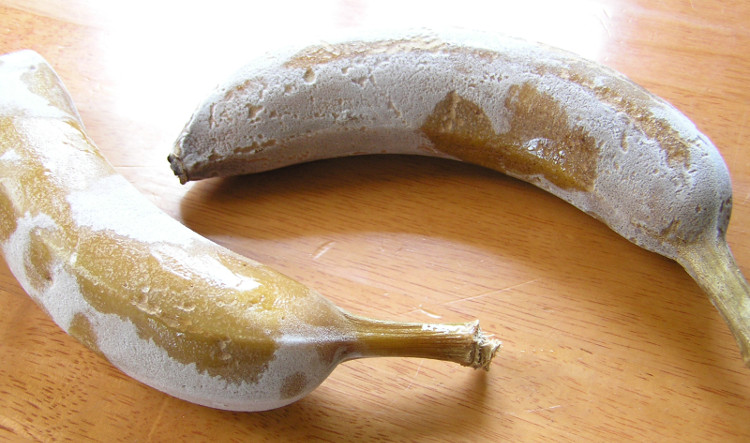Why are frozen bananas and thawed better than usual?
Have you ever observed this strange phenomenon? If not, you can try it. Take a banana and let it freeze (keep it in the freezer for about 1 day), then take it out and let it thaw. After the ice is completely removed, you will find it sweeter than normal bananas.
Think about why this happened?
Frozen fruit
According to Scienceabc, fresh fruits and vegetables, as you know, are easy to be damaged by the chemical processes inside them after being harvested. That's because fresh fruits and vegetables contain enzymes that, if activated, can lead to loss of nutrients, discoloration and changes in the taste of fresh produce.
That's why it is important to prevent activation of these enzymes (to prevent chemical reactions) if you want to preserve your fruit.

Frozen bananas.
Fruits contain water
Fruits, like most other organic substances, contain water and bananas are no exception.
Bananas (and many other fruits) are ripe and have a sweet taste when starches or other ingredients convert into sugars with the help of an enzyme called amylase . Amylase is present in foods that contain a significant amount of starch, but less sugar, such as potatoes, rice, etc.
Interestingly, amylase is also present in human saliva (and many other mammals) and plays an important role in food digestion. That's why foods contain a lot of starch, but very little sugar tastes sweet when we chew because amylase in saliva will convert part of starch into sugar.
There are usually two ways to make fruits sweeter: one, it has a high sugar content from the beginning; Two, your taste can "access" the amount of sugar in that fruit faster (compared to other fruits).
A frozen banana meets both of these factors.
What happens when one is defrosted?
As mentioned earlier, bananas contain water, so when these fruits freeze, the water inside it crystallizes and expands. This expansion breaks down the cell structure of bananas (ie, destroys cell walls).
The freezing and thawing of the fruit also affects the cells on its surface. If you taste the liquid that comes out of the fruit after thawing, you'll find it incredibly sweet.

The freezing and thawing of the fruit also affects the cells on its surface.
However, there is not much excess liquid in bananas (unlike some other fruits, such as oranges) and in the starch section, making it sweeter than normal bananas.
Another thing that happens while defrosted fruit is that all amylases can be diffused in starch when thawed. Amylase is no longer confined to the cell it begins, where it may have completed its starch conversion work that will spread to surrounding cells. This means that some of the remaining starch will be converted into sugars.
Note that the amylase enzyme (located in bananas) exists in the freezing and thawing process afterwards. The reason is that a single amylase enzyme is smaller than a cell, which is why it is rarely pierced by ice crystals. However, some amylase enzymes are destroyed. While bananas are being thawed, amylase and starch in its cells diffuse through thawed food powder. This leads to the conversion of some starch to some sugar, making the banana sweeter than usual.
- 8 reasons you should eat bananas every day
- Peeling bananas is not difficult but the truth is still full of people doing
- The reason for eating bananas is better than taking western medicine
- Dietitian: Don't be foolish to eat banana instead of breakfast
- Eat red bananas better than yellow bananas
- How to make the most of the benefits of bananas
- Why are bananas bent?
- Marvel at the most exotic and mysterious banana varieties in the world
- Why do Japanese people like to eat ripe bananas with black spots?
- Benefits when eating bananas
- Ideas are Photoshop but these blue bananas are real
- Adverse reactions of the body by eating too many bananas
 'Fine laughs' - Scary and painful torture in ancient times
'Fine laughs' - Scary and painful torture in ancient times The sequence of numbers 142857 of the Egyptian pyramids is known as the strangest number in the world - Why?
The sequence of numbers 142857 of the Egyptian pyramids is known as the strangest number in the world - Why? History of the iron
History of the iron What is alum?
What is alum?